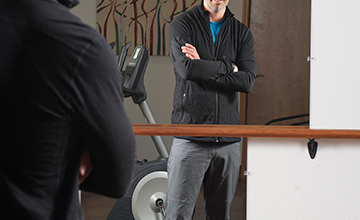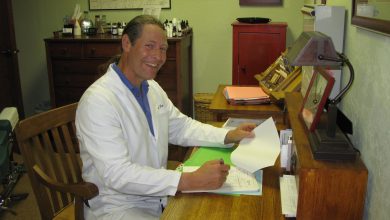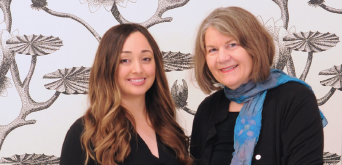Barbara Ricketts A.K.A. The Mess Doctor, Professional Organizing Services
Barbara Ricketts is Ashland’s community “Mess Doctor”. She is an experienced and recognized professional organizer who works with individuals and organizations to help them reduce clutter, save time, and create solutions to organizational and personal chaos. Barbara has been an active member of the National Association of Professional Organizers (NAPO) for over 15 years and, as a “veteran organizer”, is also a member of The Golden Circle. She is passionate about her profession and knows that dealing with clutter is not easy, but if you truly want to make changes in your life, you have to start by dealing with your physical, mental and/or emotional “stuff”. The Mess Doctor has the right “prescription” to get You organized.
We spoke together about the complexities, challenges and liberation of getting, and staying, organized.
Barbara, I love your business name. Please tell us how you became the “Mess Doctor”.
As early as I can remember, I’ve been an “Organizer” just waiting to happen! When I was a child and shared a bedroom with my younger sister, there was a line down the middle of the room. My side was always neat and organized and all the “dust bunnies” and clutter lived on my sister’s side. During my “first” career I was an “itinerant speech pathologist” working for a county school district. I served 3-4 schools every week, which meant my office was my car and I worked with my students wherever the school could find a quiet space. In this flexible work environment, my organizational skills definitely helped preserve my sanity while helping my students with their speech challenges.
After relocating to Denver, Colorado, I began my next career as a personal assistant to an interior designer in his home office. It was at this point that the “organizer” in me really began to emerge, but I still didn’t know that there was such a thing as “Professional Organizers”. My client was a very creative person, but not very organized. We made a great team because I loved organizing the office/business (papers, files, supplies, etc.) and his calendar (keeping him on time to appointments). He was a gifted designer and very successful when he knew where everything was and what he was supposed to be doing. He benefitted from my help with the organization and I discovered my talent and passion for organizing. From this beginning, he recommended me to several of his friends and, before I knew it, I had multiple clients.
I first learned about the National Association of Professional Organizers (NAPO) from a newspaper article when my husband and I moved to Massachusetts, near Boston. The article was about a professional organizer working with an appreciative client who enthusiastically talked about the positive impact getting organized had on her life. Soon after, I learned of a local NAPO chapter meeting where I discovered a group of professional, caring, like-minded people with a passion for helping others, “My People”. That first encounter was almost spiritual! Imagine being in a room of 30 people all of whom lived for and loved helping their clients find their life center again by getting their “stuff” organized! I knew I had found my calling. And I quickly realized that this occupation was a lot more than shuffling a few papers or cleaning out a closet.
Once I discovered I was (and always had been) a “Professional Organizer”, I founded my “LifeStyle Management Associates, LLC” professional organizing business. Appropriate because my focus is to help my clients manage their lifestyle through organization. In order to separate myself from the “Creative Organizers, Organizing Fairies and Simple Organizers”, etc., and to generate curiosity in people, I needed a simple, recognizable “brand name” which would fit on my license plate, hence “Mess Dr” was born. That license plate has sparked many questions at the gas pump and in parking lots.
What exactly does a professional organizer do?
Professional organizers use proven organizing principles and expertise to enhance the lives of their clients. By designing custom organizing systems and teaching organizing skills, they help individuals and businesses take control of their surroundings, their physical clutter, their time, and most importantly, their lives.
An organizer’s services can range from designing an efficient closet to organizing a cross-country move. For homeowners, he or she might offer room-by-room space planning and reorganization, estate organization, improved management of paperwork and computer files, systems for managing personal finances and other records, and/or coaching in time-management and goal setting. My particular focus is as a “residential and small business generalist”. I primarily work in people’s homes, home offices and small offices.
Why hire a professional organizer when there is organizing information in numerous books and on the Internet?
There are many books and sites that offer valuable organizing information and there is nothing wrong with using this information to help get organized. With that said, these “formula” processes in the books and on the Internet usually work best for people who are already motivated and fairly organized. Each person and their organizational project are unique and, to have the greatest chance of success requires a “unique” approach that FITS for the individual. Otherwise, there is a high probability that the organizing system will not meet expectations and/or be maintained over time. A professional organizer will bring the same knowledge, but with the additional ability to integrate all the variables of real life (such as lifestyle preference, environment, structure, communication, etc.) into a plan that is tailored for that specific client and their specific project. The true value of the professional organizer is as the “guide” that more efficiently, effectively and quickly helps the client from their existing situation to achieving their organizational goals.
Barbara, you often talk about the cost of clutter. Can you give us a few examples of what you mean?
Clutter and disorganization can be a financial cost due to duplicate purchases of items and supplies we already have but can’t find; late fees due to lost bills; wasted time (which is $$) looking for misplaced items and missed business opportunities. It can also lead to procrastination. But clutter can also affect our health by distracting us from what’s important in life, causing confusion, depression and weight issues (there are organizing “diet books”: “Does This Clutter Make My Butt Look Fat?” An easy plan for losing weight and living more by Peter Walsh and “Stuff You Face or Face Your Stuff “, Lose weight by de-cluttering your life by Dorothy Breninger). One of the greatest costs of clutter, however, is the way it affects energy. It physically saps our energy and any kind of clutter also affects the smooth flow of energy in our environment, which, according to Feng Shui practitioner Karen Kingston, creates confusion in our lives. And clutter prevents any chance of attaining true peace of mind!
Your job requires a high level of professionalism, care and attention. Can you speak to this?
Because I work in people’s homes and in their small offices, I first acknowledge that I am entering the most private and important areas of their lives. I respect this privilege by strictly abiding by the NAPO Code of Ethics and my own code of ethics. I serve my clients with integrity, competence, confidentiality and objectivity and treat them with respect and courtesy. It is my policy to be completely discreet about my clients and their business. Confidentiality is guaranteed in my consulting policies. I offer non-judgmental consulting and/or hands-on services to help them get better organized.
Tell us about your process of working with a client.
People call me for many different reasons and each person’s organizational challenges are unique. Most conversations start with, “I’m overwhelmed with my stuff (papers, kid’s things, you fill in the blank!), I’m confused and out of control. I know I have to do something, but I don’t know where to begin. What do you do and can you help me?” Then we discuss the organizing project. I get a lot of information in this first phone conversation. I also introduce myself, what I do, and we decide if their project and my services are a fit. This is critical to a successful working relationship.
My client and I must have a high level of trust and respect for each other. If it is a good fit for both, we schedule a “Needs Assessment” and meet at their home or office and discuss the project. They show me around to each space that is a challenge and they describe what is an issue for them. I explain how I would proceed, and answer their questions and they decide if they want to schedule a session.
When a person becomes my client they are getting a dedicated professional organizer who is compassionate, responsible, and professional. I have the ability to customize organizational systems to meet my clients’ needs and teach organizing skills. I work on the “big picture” and break goals down into manageable projects. I provide support and accountability which leads to success. My goal, in most cases, is to work myself out of a job as quickly and efficiently as possible by empowering my client.
Professional organizers are viewed in a variety of ways. Would you expand on this?
In over 16 years I have worked with 400+ clients. Each and every one is a unique individual with his or her own unique circumstances. In addition, each sought out professional organizing assistance for their own distinct reasons. There is a continuum that clients fall into, from one end where a person may need their own organizing systems simply confirmed/approved by a “professional”, perhaps their systems need a little “fine-tuning”, to the other end where a person is just totally overwhelmed with their disorganization and clutter. This person may be frozen in place and can’t move forward in any areas of their life. They may even have shame and self-worth issues.
But, most of my clients fall in the center of this continuum; they are simply people with a challenge in the area of organization and clutter. They find it difficult to make decisions about their “things”; they can’t let go of stuff that is broken, outdated, no longer needed or used. For some, there is a feeling of embarrassment that they need help to “get organized”; and sometimes there isn’t a second thought about seeking help because it’s easy to admit they weren’t born with the “organizing gene”.
Some clients are so thrilled with the process and the positive impact it has on their life overall, that they willingly share this information as they would a decorator, etc. with friends and neighbors and even introduce me as a “friend” or “the organizer” who has helped them make the changes that impacted their life. I’m also aware that some clients are more private and don’t want people knowing too much about their personal lives. For those, I may even park my car a few houses down the street since my license plate reads MESS DR. I always want to respect my clients’ wishes and confidentiality.
One of your favorite quotes is: “It’s not lost, I just can’t find it right now.”
A client used to say this when she was looking for something. It was her way of denying how her clutter and chaos was affecting her life. Sometimes it took her several hours to find critical documents, like passports & bills; once she even missed a very important appointment because she couldn’t find her car keys! She also used to pay numerous late fees because bills got lost, so I assisted her in setting up on-line bill paying. After getting her home office organized, she mentioned that she ultimately saved more money than she had invested in getting organized. In fact, her comment was, “I didn’t realize that I was at the point I couldn’t afford NOT to get organized.”
What is the favorite part of your job, Barbara?
Working side-by-side with a client who wants a change in their life and seeing them recognize that it is their clutter and chaos that is holding them back. Then as we work through the organizing process they begin making decisions about their “stuff”, and they realize that living “lighter” is freeing them to appreciate what is really important to them. Now they have the freedom to do what they truly want to do with their time and they have a clear space, peace of mind and more control over their life. Being a contribution to my clients is so rewarding.
Do you ever find yourself reorganizing things when you’re out and about?
I can’t stand to see clothes in stores hanging off racks. I have to straighten them up! But where I really go wild is when I check into a hotel. First off, I head straight for the bathroom and get the ice bucket out of there… I’ve never needed an ice bucket in the bathroom, have you? (laughs) Then, I clear off the counter, rearrange it, and put my things in there; next I rearrange the room furniture as needed. I don’t think that’s too unreasonable, do you? (laughs again). What’s really mind-boggling though, is to multiply me times 800, now you have the annual NAPO Conference with professional organizers everywhere you turn! As you can imagine, re-organizing and improved efficiency suggestions can start at the check-in desk of the hotel and spread all the way to the bartender with advice on how to pour drinks more proficiently! And, of course each session during this conference starts-on-time! That’s why I love attending OSF plays… They start on time.
Barbara, what are your top ten organizing tips?
Identify items you don’t need, use, or are broken and Get Rid Of Them.
Put the items you use the most close to you where you use them.
Always open your mail over a large wastebasket and keep a crosscut shredder close.
Plan ahead before starting a project, and then work the plan!
Be realistic about the time needed to accomplish tasks.
To avoid procrastination, complete your “worst tasks” early in the day.
Use a timer when answering email. Set a specific amount of time to do email then play “beat the clock”. (You have to stop when time is up!) This will keep you focused, on task, eliminate long unnecessary email responses and reduce wasted time. (Have you ever wondered where that 2 hours went when you were on email?)
Prioritize daily tasks and don’t start a second task until the first one is completed.
Delegate whenever possible.
If you haven’t used an item or worn an article of clothing in a year, let it go.
Can you share a recent success story with us?
Yes. One that comes to mind right away is a woman who moved to Ashland a year or so ago after the death of her husband, and she had also downsized from a much larger home. She found that she just couldn’t deal with the combination of the downsizing and the grief of letting go of what she and her husband had shared together in their larger home. But she had also become very frustrated with all the “stuff” and just could not seem to get organized on her own. Fortunately, she had already managed to clear out her storage unit, but her garage and extra bedroom were chockfull, and it had spilled over into her entryway and living room areas.
She had seen an article about me and gave me a call. We sat down at her dining room table one morning and made a plan. Now, I have to say here that she was really ready to make some changes and move forward; she had a clear sense that in order to reach some of the new goals she had set for herself, she needed to let go of some of these other things.
After our meeting, she got busy right away and within a week was sending me “before & after” photos, and even had a garage sale. We set up a schedule for regular “check-ins” by email and phone, and also set some concrete, very do-able goals. One day, when she became emotionally overwhelmed trying to go through office papers, she emailed me about it. I called her and we were able to talk it through. I was so pleased at how she grabbed the ball and ran with it and in just weeks had really made some major changes in her living space.
She has thanked me and told me that it helped her to “free the log jam and get the energy flowing again.” I’m really pleased because I can see how it has helped her begin to move forward in other areas of her life as well.
You mentioned you have helped individuals get organized after the loss of a loved one. Can you share more about this?
There are particular challenges for some people when they have to deal with items inherited from a loved one that passes away. People all grieve differently and for different periods of time. When it is decided the time is right to deal with these items (it might be a whole house full or just a few boxes) it can be an overwhelming and very emotional issue. In fact, family members often are not the best to help with this process. I come into the situation neutral and not emotionally attached to the client’s personal things.
I provide support and sensitivity to complete this process by helping to set goals, keeping focused on the task, while also allowing my client to “tell me about” (sometimes tearfully) a special item or heirloom we find. Heirlooms can radiate a force field of guilt and telling this story can serve as a good- bye “ceremony” which makes it possible to let it go. I also help find “the right home” for things to be donated or sold.
Having the appropriate support can make all the difference between living with “unfinished business” which can have a negative physical and emotional impact, or being able to “move on” when it’s time.
Why is it important to find the “perfect” home for precious and sentimental items?
Many people believe that Organizing is about “Throwing Things Out”. This can be a significant obstacle for people when they are thinking of hiring a Professional Organizer, and it is far from reality. Most items a person has in their life have some degree of significance to them. I recognize that significance resides in the “client“ and not the “item” and sometimes the implication is not positive.
In some cases, finding the “right place” for items means the difference between letting something go, knowing that item will continue to provide for someone else, or keeping something that becomes clutter and eventually gets ruined or broken when kept in a garage or storage unit.
What are your favorite projects to take on and why?
That’s an easy question. I love working with someone who is highly motivated and ready to tackle areas filled with boxes or bags of things that have been sitting around for so long they can’t remember what’s inside. I had a retired teacher who needed to clear out the closets in her home office. As we started sorting and going through the closets it became a “treasure hunt”. She found gift certificates, money and gifts that had been “put away” and then forgotten, as well as a couple of small heirlooms she had lost several years earlier. As we got into the project, her attitude went from dread to excitement and time just flew by. At the end of this one session, she found several hundred dollars in cash and some priceless mementos. She told me she now felt “lighter and happier” in her office and couldn’t wait to schedule her next session. She had tears in her eyes as she hugged me when I left that day!
Often times a spouse or a friend might lovingly suggest working with you. Can you speak about this and the self-realization you like to see in your clients?
I have gotten calls from friends or relatives of a person who seems to be “messy” or “disorganized”. This well-meaning friend is inquiring with love about getting a gift certificate for my services to give as a present. If, however, this is going to be a surprise, I caution the friend to be very careful because this could be viewed as an insult. Not everyone wants “help” in this area, even if they do have challenges. It’s like giving someone a “make-over” and the response is, “Am I so ugly I need a make-over”? Instead of being thrilled with some “pampering”, which was the intent, it is viewed as “offensive”.
If you want to make a suggestion that your friend or spouse work with an organizer, I would start a conversation with, “it seems that sometimes you are a bit overwhelmed with paper, appointments, the house, etc… whatever is appropriate. “Would you be open to a phone conversation with someone who could help you with this?” Say this in a caring, neutral tone of voice and be assured that when we talk on the phone I will be attentive, gentle and focused on their “organizing project”. It is always best that a person not be taken by surprise or belittled into the idea of working with me.
Do you offer a free introductory consultation for individuals interested in your services?
Yes, I do an initial phone consultation to make sure their project and my expertise is a fit.
Finally, any last words or comments you would like to share with our readers?
Yes, I would say that if you want more control over your life and are looking for peace of mind and less stress, take a look at the “stuff” you have around you. If you want to make a change and you can’t do it alone, know that there is help!
I would like to leave your readers with some parting thoughts on Organizing~
West’s First Law of Clutter:
Void of organizational systems, clutter tends to expand over time in direct proportion to the volume of space in any given, finite environment.
West’s Second Law of Clutter:
Every object in a collection of disarray in any given space tends to remain in that state until an external force is applied to it.
West’s Third Law of Clutter:
For every action of not putting an object in it’s place after using it, there is an opposite and undesirable reaction when attempting to locate and use that object again, resulting in time wasted looking for it.
And
“Learn to let go, that is the key to happiness”.
~Buddha
Business Information
Barbara Ricketts
LifeStyle Management Associates, LLC
P.O. Box 819 Ashland, OR 97502
Phone: 661-433-7263
Website: TheMessDoctor.com




